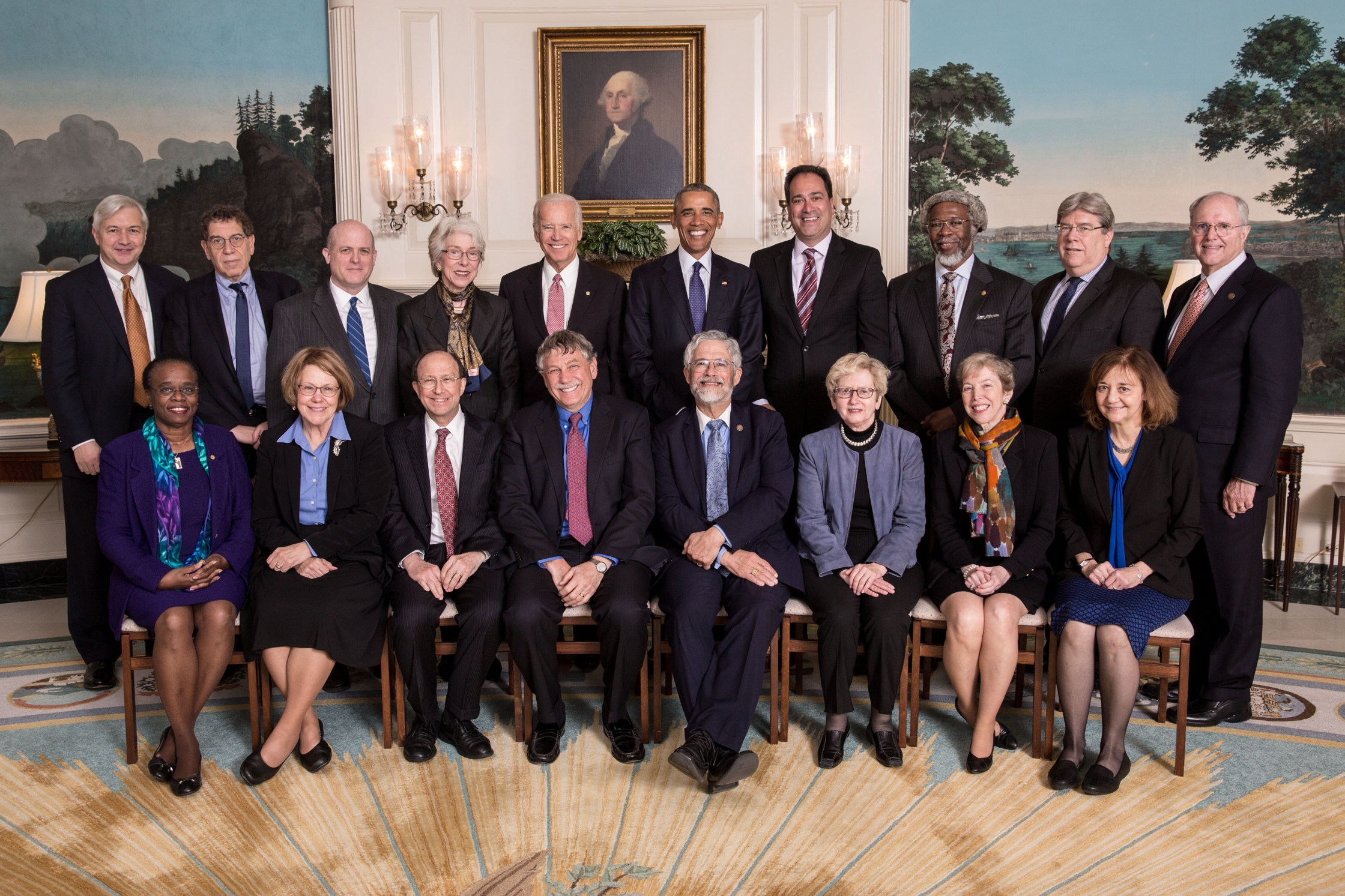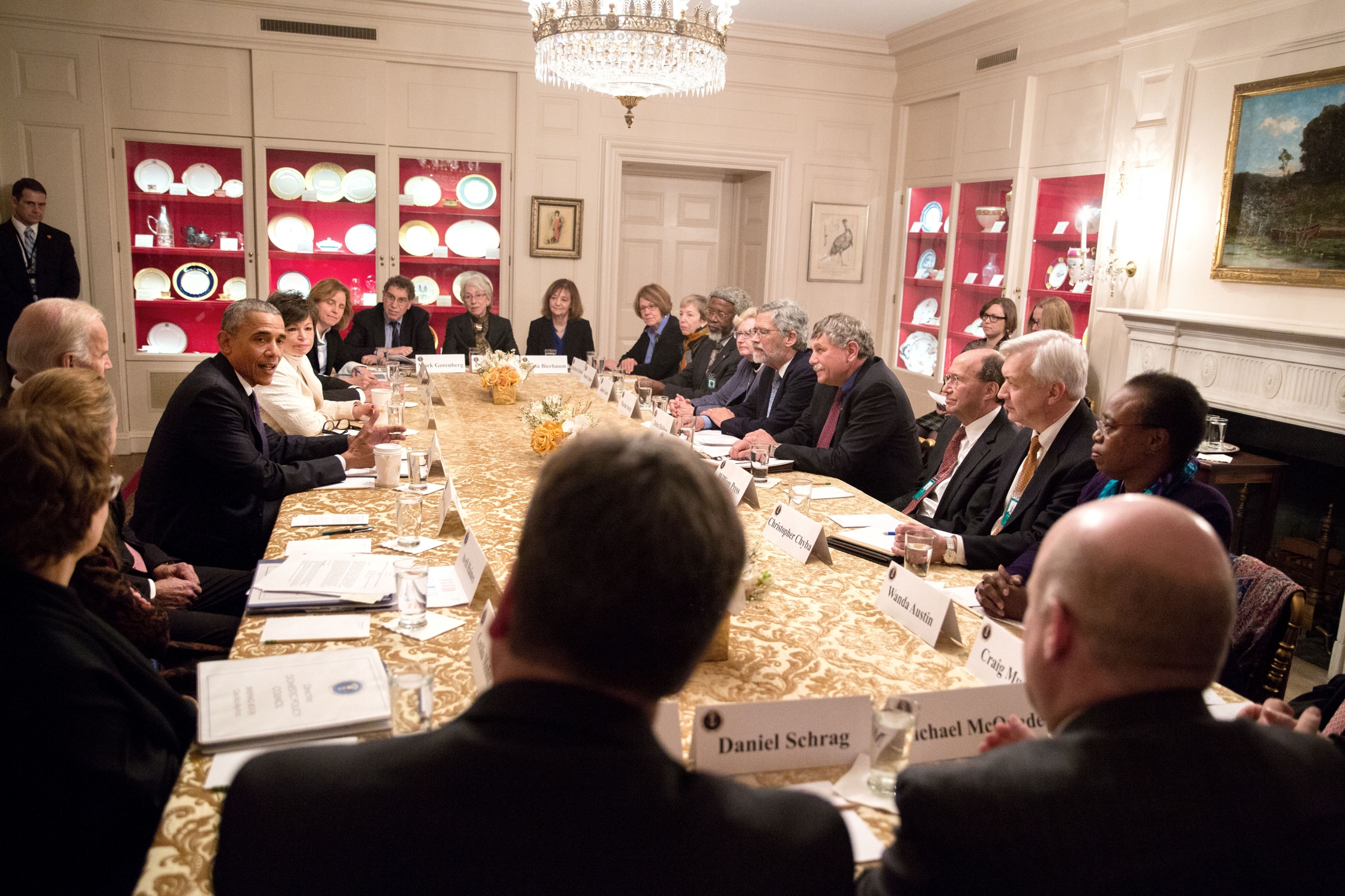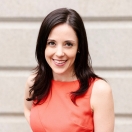
As part of President Obama's inaugural address pledge to restore science to its rightful place, the President reinvigorated the President's Council of Advisors on Science and Technology (PCAST), which augments the science, technology, and innovation advice available from full-time government employees with part-time advisors who are leaders in science and technology in the private and academic sectors.

The Administration's PCAST is arguably the most distinguished and diverse in the history of presidential science and technology advisory bodies, which in their current form date back to the Eisenhower Administration. The PCAST members hailed from academia, industry, venture capital, and nonprofits and collectively had expertise across nearly all S&T disciplines. This combination led to an unparalleled ability to investigate problems, brainstorm new ideas, distill findings, and generate recommendations for the President and to serve the best interest of the American people. This PCAST had
- 25 total members across 8 years,
- 39 reports to the President,
- 45 in-person meetings in Washington, DC, and
- 400+ working group members and expert contributors.
The reports gave recommendations to the President on topics ranging from energy innovation to forensics to health to advanced manufacturing, and many of their recommendations have been embodied in Presidential initiatives. The breadth of work went from top-down analysis and strategy development to practical solutions to problems affecting American’s everyday lives. PCAST's discussed its accomplishments at the Council’s final meeting last Friday, January 6th. A few examples of how PCAST reports directly affected policy are:
- Accelerating the Pace of Change in Energy Technologies Through an Integrated Federal Energy Policy (2010) was an important contributor to the President’s Climate Action Plan and led to the development of the Department of Energy’s Quadrennial Technology Reviews and the interagency Quadrennial Energy Review.
- Two reports—Prepare and Inspire: K-12 Science, Technology, Engineering, and Math (STEM) Education for America’s Future (2010) and Engage to Excel: Producing One Million Additional College Graduates with Degrees in Science, Technology, Engineering, and Mathematics (2012)—not only informed STEM-education efforts in the Office of Science and Technology Policy, the Domestic Policy Council, and the Department of Energy but also catalyzed numerous independent organizations and individual educators to take action for STEM education.
- Realizing the Full Potential of Government-Held Spectrum to Spur Economic Growth (2012) led to a Presidential Memorandum in 2013 and to FCC approval, in 2016, of a 150 MHz Citizens Broadband Radio Service “Innovation Band” for spectrum sharing.
- Combating Antibiotic Resistant Bacteria (2014) led to an Executive Order and informed the National Strategy and Action Plan to keep Americans and their healthcare providers one step ahead of life-threatening infections.
- Aging America and Hearing Loss: Imperative of Improved Hearing Technologies (2015) informed FDA’s 2016 announcement to begin a regulatory process allowing over-the-counter hearing aids.
On behalf of the Obama Administration and a grateful Nation, we thank the PCAST members for 8 years of unflagging dedication and service to the country.

Current and former PCAST members include:
1.Co-Chair John Holdren, Assistant to the President for Science and Technology and Director of the White House Office of Science and Technology Policy
2.Co-Chair Eric Lander, Director of the Broad Institute of MIT and Harvard, Professor of Biology at MIT, and Professor of Systems Biology at Harvard Medical School
3.Co-Chair Harold Varmus, President, Memorial Sloan Kettering Cancer Center (currently Lewis Thomas University Professor of Medicine at Weill Cornell Medicine)
4.Vice-Chair William Press, Professor of Computer Sciences at the University of Texas at Austin and former Deputy Director of the Los Alamos National Laboratory
5.Vice-Chair Maxine Savitz, General Manager (retired) of Technology Partnerships, Honeywell, Inc.
6.Wanda Austin, President and CEO (retired), Aerospace Corporation
7.Rosina Bierbaum, Professor (and former Dean) of Natural Resources and Environment, University of Michigan and the Roy F. Westin Chair in Natural Economics, University of Maryland
8.Christine Cassel, Planning Dean, Kaiser Permanente School of Medicine
9.Christopher Chyba, Professor of Astrophysical Sciences and International Affairs and former Director, Program on Science & Global Security, Princeton University
10.S. James Gates Jr., John S. Toll Professor of Physics and Director, Center for String and Particle Theory, University of Maryland, College Park
11.Mark Gorenberg, Founder and Managing Director, Zetta Venture Partners
12.Susan L. Graham, Professor of Electrical Engineering and Computer Science Emerita, University of California, Berkeley
13.Shirley Ann Jackson, President, Rensselaer Polytechnic Institute
14.Richard Levin, President, Yale University (currently CEO, Coursera)
15.Michael McQuade, Senior Vice President, Science & Technology, United Technologies Corporation
16.Chad Mirkin, George B. Rathmann Professor of Chemistry, Professor of Medicine, Professor of Materials Science and Engineering, Professor of Biomedical Engineering, Professor of Chemical and Biological Engineering, and Director of the International Institute for Nanotechnology, Northwestern University
17.Mario Molina, Distinguished Professor of Chemistry and Biochemistry, University of California, San Diego
18.Ernest Moniz, Cecil and Ida Green Professor of Physics and Engineering Systems and Director, Laboratory for Energy and the Environment, Massachusetts Institute of Technology (currently U.S. Secretary of Energy)
19.Craig Mundie, President, Mundie Associates; formerly Senior Advisor to the CEO and Chief Research and Strategy Officer, Microsoft
20.Ed Penhoet, Director, Alta Partners, and Professor of Biology, University of California, Berkeley
21.Barbara Schaal, Dean of Arts and Sciences and Professor of Biology at Washington University in St Louis
22.David E. Shaw, Chief Scientist, D. E. Shaw Research
23.Eric Schmidt, Executive Chairman, Alphabet
24.Daniel Schrag, Hooper Professor of Geology and Professor of Environmental Science and Engineering, Harvard University, and Director of the Harvard University Center for Environment
25.Ahmed Zewail (deceased 2016), Linus Pauling Chair Professor of Chemistry, Professor of Physics, and Director, Physical Biology Center for Ultrafast Science and Technology, California Institute of Technology
Ashley Predith is Executive Director of the President's Council of Advisors on Science and Technology for the White House Office of Science and Technology Policy.
Kristin Lee is Communications Director and Senior Policy Analyst for the White House Office of Science and Technology Policy.


